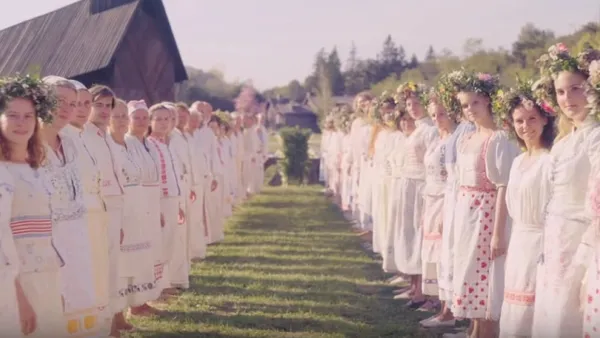Eye For Film >> Movies >> Midsommar (2019) Film Review
Midsommar
Reviewed by: Jennie Kermode

In Ari Aster's eagerly anticipated follow-up to Hereditary, time is seriously out of joint. The film opens in the US, where it's snowing, with a group of friends discussing a planned trip to Sweden for a midsummer festival to be held in two weeks' time - yet we're not in Alaska, as when we get to Sweden one of those friends freaks out about the sky still being blue at 9pm. There, too, something is wrong. As any northerner will tell you, the sun staying above the horizon at midsummer doesn't mean that it stays high in the sky, yet aside from a couple of brief nighttime sequences there's nary a shadow to be seen, as if it were always noon. Furthermore, this June event involves, among other things, the anointing of a May Queen. This gives us two possible ways of interpreting the rest of what we see and hear. Either this is a product of carelessness and the film's successes are just a happy accident, or Aster is working from the start to disorientate us and manoeuvre us into a space where we can take nothing for granted.
There's a fair bit of evidence for the latter. An early sequence in which the protagonists drive along the road towards the commune where they will be staying sees the camera flip over, gradually turning us upside down so that the road surface flows along like a grey tarmac river above us with the sky below. It's beautifully paced so as to capture that sense of drift that long car journeys can induce. Shortly afterwards, the Americans take a mushroom trip, one of several episodes of drug use to feature in the film. Aster frequently invites us to question whether what we're seeing is real, supernatural or hallucinatory.

In addition to his, there's a layer of psychological disorientation. Heroine Dani (an excellent Florence Pugh) has been raised by a mother who is afflicted by severe mental illness. From time to time there are hints that she may have inherited something of this. She's also in mourning for her mother by the time the real action gets underway, which distorts her emotional responses and sees her exhibit stress responses which include panic attacks and freezing. Pugh never overplays this; in fact, we're invited to question it by her resentful boyfriend Christian (Jack Reynor). Inexperienced as they are, neither of these young people really has the experience or self awareness needed to understand the other. They wear on one another in a myriad little ways. Despite the dramatics of the central plot, it's the uneasiness of their relationship that powers the film.
Accompanying them are three fellow students, one of whom - Pelle (Vilhelm Blomgren) - is originally from the commune and has invited them to join the summer festivities. Folklore is full of invitations like this and most viewers will be wary from the start, despite the warm sun and friendly people with their quaint clothes and garlands of flowers. Keen anthropologist Josh (William Jackson Harper) encourages the others to be respectful of cultural difference and much of this is reasonable - even a shocking act witnessed halfway through has genuine roots in Scandinavian tradition, though it would likely be frowned upon in your average Stockholm suburb. There's some rather liberal use of runes, not all of which make thematic sense, but Swedish involvement in the film has thankfully put constraints on that sort of thing. It's also lent it a sly humour. This is less a case of Americans monstering Swedish heritage than it is a case of Swedes gently taking the piss out of American cluelessness.
It's the humour that gives the film its edge, making sure that viewers can never quite be certain of anything and enhancing the sense of creepiness on which it depends. It takes its time to build but Pawel Pogorzelski's evocative cinematography will hold your attention in the meantime. One can almost smell the summer grass, the wildflowers and freshly turned hay. There's a timelessness about this environment in which protagonists from a young country are completely lost. It's the same sense of timelessness that comes with grief, and it makes room for Dani's emotional journey to be a process of recovery not just from her bereavement but from everything she has been taught about who she is and how she should live. Midsommar is all about perspective and will leave you questioning what, besides size, really differentiates a cult from any other society. Who is brainwashed? What does it mean to be free? Is there a time when the sanest thing is stop caring about what's real?
Reviewed on: 15 Jan 2020
















